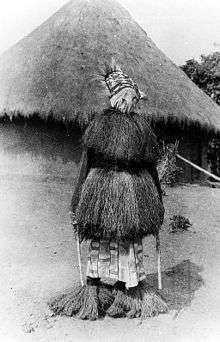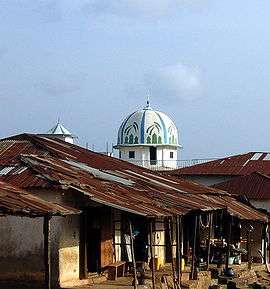Religion in Liberia
According to the 2008 National Census, 85.5% of Liberia's population practices Christianity.[2] Muslims comprise 12.2% of the population, largely coming from the Mandingo and Vai ethnic groups.[2] The vast majority of Muslims are Malikite Sunni, with sizeable Shia and Ahmadiyya minorities.[3]
Traditional indigenous religions are practiced by 0.5% of the population, while 0.4% subscribe to no religion.[2]
Religions
Adherents
Christianity is by far the most common faith in Liberia, with recent surveys showing Christians making up 83-86% of the population, up significantly from surveys in the 1980s. By contrast, Islam has declined slightly from 14-15% in the 1980s to 11-12% in recent surveys. Traditional religions and non-religious individuals have seen greater declines.
| Affiliation | 1984 Census[4] | 1986 DHS Survey[4] | 2007 DHS Survey[5] | 2008 Census[6] | 2013 DHS Survey [7] |
|---|---|---|---|---|---|
| Christian | 67.7% | 54.2% | 83.3% | 85.5% | 84.2% |
| Muslim | 14.4% | 14.2% | 11.1% | 12.2% | 11.8% |
| Traditional | 18.1% | 12.5% | 1.5% | 0.6% | 0.9% |
| Other/Unknown | 0.8% | 0.2% | 0.3% | ||
| None | 18.9% | 3.4% | 1.5% | 2.8% | |
| Notes
| |||||
Christianity
Christian denominations include the Lutheran, Baptist, Episcopal, Presbyterian, Roman Catholic, United Methodist, African Methodist Episcopal (AME) and AME Zion denominations, and a variety of Pentecostal churches. Some of the Pentecostal movements are affiliated with churches outside the country, while others are independent. There are also members of the Church of Jesus Christ of Latter-day Saints (Mormons) and Seventh-day Adventists. Christians live throughout the country.
In a religious context, the term kwi connotes a style of worship of a particular Christian church which is marked by formality and decorum.[8] Kwi is a Liberian term used to connote Westernization.[9] Services in churches considered to be non-kwi have more outward spiritualist expression, with dancing and even street processions in colorful costumes as key elements. Non-kwi churches also have self-proclaimed prophets who interpret dreams and visions, and prioritize a direct experience with the Holy Spirit. Liberia's educated elite have historically regarded the apostolic churches as churches of the uneducated and thus non-kwi.[8]
Islam
The Muslim population is mainly found among the Mandingo and the Vai ethnic groups. Vai live predominantly in the west. Mandingo reside throughout the country.
Traditional beliefs

Regardless of public statements of identification with Christianity, a "vast majority"[10] of Liberians believe a supernatural world of ancestral and bush spirits that impact daily life.[10] Ethnic groups in all regions of Liberia participate in the traditional religious practices of the Poro and Sande secret societies, with the exception of the Krahn ethnic group, who have their own secret society.[11]
"Liberian religious culture is characterised by a predisposition towards secrecy (encapsulated in the concept of ifa mo - "do not speak it") and an ingrained belief in the intervention of mysterious forces in human affairs".[11] "Both elite and non-elite Liberians usually attribute events to the activities of secret powers and forces".[12]
"Beliefs include the conviction that there are deep and hidden things about an individual that only diviners, priests, and other qualified persons can unravel.[10] This presupposes that whatever exists or happens in the physical realm has foundations in the spirit world".[10]
Secret societies
The Sande society is a female secret society found in Liberia, Sierra Leone, Guinea and the Ivory Coast that initiates girls into adulthood, confers fertility, instills notions of morality and proper sexual comportment, and maintains an interest in the well-being of its members throughout their lives. In addition, Sande champions women's social and political interests and promotes their solidarity vis-a-vis the Poro society, a complementary institution for men. Today this social institution is found among the Bassa, Gola, Kissi, Kpelle, Loma, People and Vai of Liberia.
Throughout the region, the complementarity of men's and women's gender roles – evident in such diverse activities as farming, cloth production, and musical performances – reach full expression. The women's Sande and men's Poro associations alternate political and ritual control of "the land" (a concept embracing the natural and supernatural worlds) for periods of three and four years respectively. During Sande's sovereignty, all signs of the men's society are banished.[13][14]
At the end of this three-year period, the Sande leadership "turns over the land" to its counterparts in the Poro Society for another four years, and after a rest period the ritual cycle begins anew. The alternating three- and four-year initiation cycles for women and men respectively are one example of the widespread use of the numbers 3 and 4 to signify the gender of people, places and events; together the numbers equal seven, a sacred number throughout the region.[13][14]
Bahai
The Bahá'í Faith in Liberia begins with the entrance of the first member of the religion in 1952.[15] By the end of 1963 there were five assemblies[16] and Liberian Bahá'ís elected their first National Spiritual Assembly in 1975.[17] The community was somewhat disrupted by the First Liberian Civil War[18] but re-established their National Spiritual Assembly in 1998.[19] Almost 9,500 Bahá'ís are believed to have been in Liberia in 2006.[20]
Dynamics
A large number of foreign missionary groups work openly and freely in the country. The Constitution provides for freedom of religion, and the Government generally respects this right in practice. Despite frequent interaction among religious groups, some tensions remain. Some societal abuses or discrimination based on religious belief or practice occur.
See also
- Roman Catholicism in Liberia
- The Church of Jesus Christ of Latter-day Saints in Liberia
References
- "Religions in Liberia - PEW-GRF". www.globalreligiousfutures.org. Archived from the original on November 6, 2018. Retrieved October 6, 2018.
- "International Religious Freedom Report 2010: Liberia". United States Department of State. November 17, 2010. Archived from the original on November 23, 2010. Retrieved July 22, 2011.
- "The World's Muslims: Unity and Diversity" (PDF). Pew Forum on Religious & Public life. August 9, 2012. Retrieved March 31, 2014.
- "Liberia: Demographic and Health Survey, 1986" (PDF). Ministry of Planning and Economic Affairs. p. 10. Retrieved 21 April 2018.
- "Liberia: Demographic and Health Survey, 2007" (PDF). Liberia Institute of Statistics and Geo-Information Services, Ministry of Health and Social Welfare, and National AIDS Control Program. p. 10. Retrieved 21 April 2018.
- "2008 Population and Housing Census: Final Results" (PDF). Liberia Institute of Statistics and Geo-Information Services. p. A4-84. Retrieved 21 April 2018.
- "Liberia: Demographic and Health Survey, 2013" (PDF). Liberia Institute of Statistics and Geo-Information Services, Ministry of Health and Social Welfare, and National AIDS Control Program. p. 34. Retrieved 20 April 2018.
- Liberia Country Study, "The Christianity of Indigenous Africans", GlobalSecurity.org
- "Culture of Liberia", EveryCulture.com
- Culture and customs of Liberia, by Ayodeji Olukoju, Greenwood Publishing Group, 2006, p. 24.
- Culture and customs of Liberia, by Ayodeji Olukoju, Greenwood Publishing Group, 2006, p. 25.
- Culture and customs of Liberia, by Ayodeji Olukoju, Greenwood Publishing Group, 2006, p. 23.
- Leopold, Robert S. (1983). "The Shaping of Men and the Making of Metaphors: The Meaning of White Clay in Poro and Sande Initiation Society Rituals". Anthropology. 7 (2): 21–42.
- Sawyerr, Harry, and S. K. Todd (1970) The Significance of the Numbers Three and Four among the Mende of Sierra Leone. Sierra Leone Studies (n.s.) 26: 29-36.
- L. Holman, Donna (2006-08-04). "Focus on spirituality". The Times and Democrat, Orangeburg, SC.
- Compiled by Hands of the Cause Residing in the Holy Land. "The Bahá'í Faith: 1844-1963: Information Statistical and Comparative, Including the Achievements of the Ten Year International Bahá'í Teaching & Consolidation Plan 1953-1963". pp. 50, 99–100.
- Locke, Hugh C. (1983). "In Memoriam". Bahá'í World, Vol. XVIII: 1979-1983. pp. 778–9, 624, 626, 629.
- Hansen, Holly. "Overview of Bahá'í Social and Economic Development". Bahá'í World, 1992-93. pp. 229–245.
- Universal House of Justice (April 2000). "Ridvan 1998". Published Documents from the Universal House of Justice. Bahá'í Library Online. Retrieved 2008-11-15.
- "Republic of Liberia". Operation World. Paternoster Lifestyle. 2006. Retrieved 2008-11-15.
